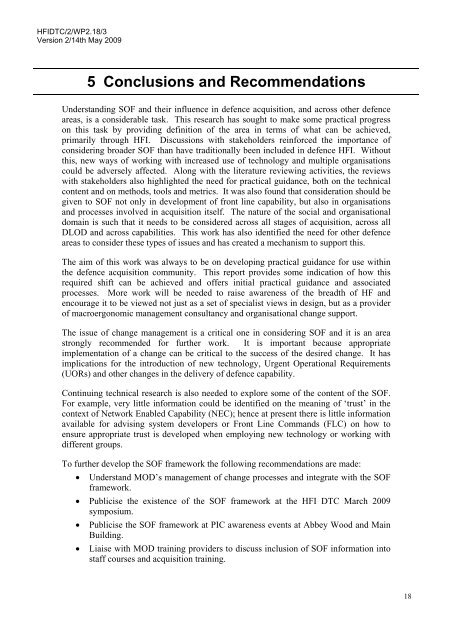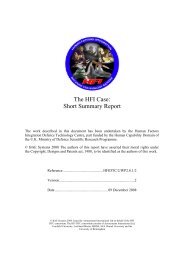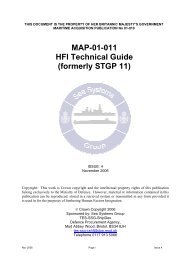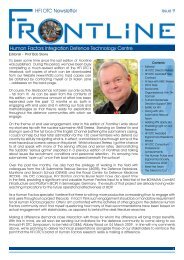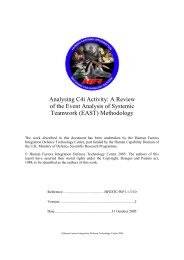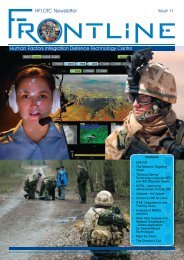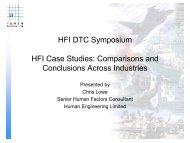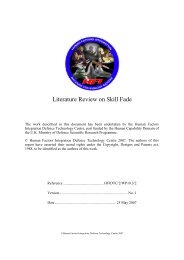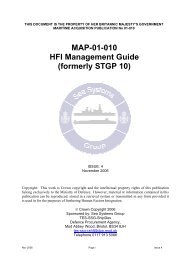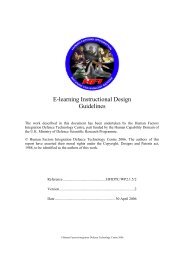Developing the HFI Social & Organisational Domain: Final Report
Developing the HFI Social & Organisational Domain: Final Report
Developing the HFI Social & Organisational Domain: Final Report
Create successful ePaper yourself
Turn your PDF publications into a flip-book with our unique Google optimized e-Paper software.
<strong>HFI</strong>DTC/2/WP2.18/3Version 2/14th May 20095 Conclusions and RecommendationsUnderstanding SOF and <strong>the</strong>ir influence in defence acquisition, and across o<strong>the</strong>r defenceareas, is a considerable task. This research has sought to make some practical progresson this task by providing definition of <strong>the</strong> area in terms of what can be achieved,primarily through <strong>HFI</strong>. Discussions with stakeholders reinforced <strong>the</strong> importance ofconsidering broader SOF than have traditionally been included in defence <strong>HFI</strong>. Withoutthis, new ways of working with increased use of technology and multiple organisationscould be adversely affected. Along with <strong>the</strong> literature reviewing activities, <strong>the</strong> reviewswith stakeholders also highlighted <strong>the</strong> need for practical guidance, both on <strong>the</strong> technicalcontent and on methods, tools and metrics. It was also found that consideration should begiven to SOF not only in development of front line capability, but also in organisationsand processes involved in acquisition itself. The nature of <strong>the</strong> social and organisationaldomain is such that it needs to be considered across all stages of acquisition, across allDLOD and across capabilities. This work has also identified <strong>the</strong> need for o<strong>the</strong>r defenceareas to consider <strong>the</strong>se types of issues and has created a mechanism to support this.The aim of this work was always to be on developing practical guidance for use within<strong>the</strong> defence acquisition community. This report provides some indication of how thisrequired shift can be achieved and offers initial practical guidance and associatedprocesses. More work will be needed to raise awareness of <strong>the</strong> breadth of HF andencourage it to be viewed not just as a set of specialist views in design, but as a providerof macroergonomic management consultancy and organisational change support.The issue of change management is a critical one in considering SOF and it is an areastrongly recommended for fur<strong>the</strong>r work. It is important because appropriateimplementation of a change can be critical to <strong>the</strong> success of <strong>the</strong> desired change. It hasimplications for <strong>the</strong> introduction of new technology, Urgent Operational Requirements(UORs) and o<strong>the</strong>r changes in <strong>the</strong> delivery of defence capability.Continuing technical research is also needed to explore some of <strong>the</strong> content of <strong>the</strong> SOF.For example, very little information could be identified on <strong>the</strong> meaning of ‘trust’ in <strong>the</strong>context of Network Enabled Capability (NEC); hence at present <strong>the</strong>re is little informationavailable for advising system developers or Front Line Commands (FLC) on how toensure appropriate trust is developed when employing new technology or working withdifferent groups.To fur<strong>the</strong>r develop <strong>the</strong> SOF framework <strong>the</strong> following recommendations are made:• Understand MOD’s management of change processes and integrate with <strong>the</strong> SOFframework.• Publicise <strong>the</strong> existence of <strong>the</strong> SOF framework at <strong>the</strong> <strong>HFI</strong> DTC March 2009symposium.• Publicise <strong>the</strong> SOF framework at PIC awareness events at Abbey Wood and MainBuilding.• Liaise with MOD training providers to discuss inclusion of SOF information intostaff courses and acquisition training.18


